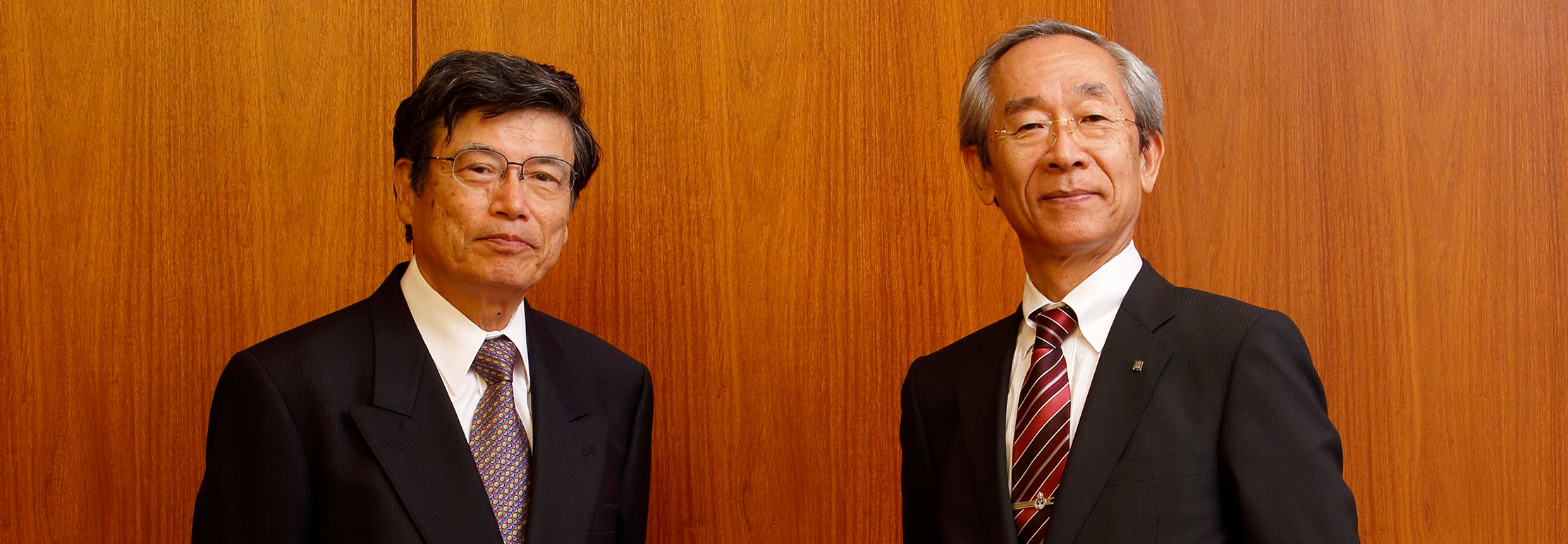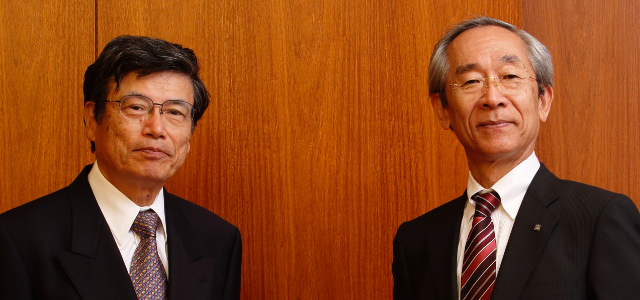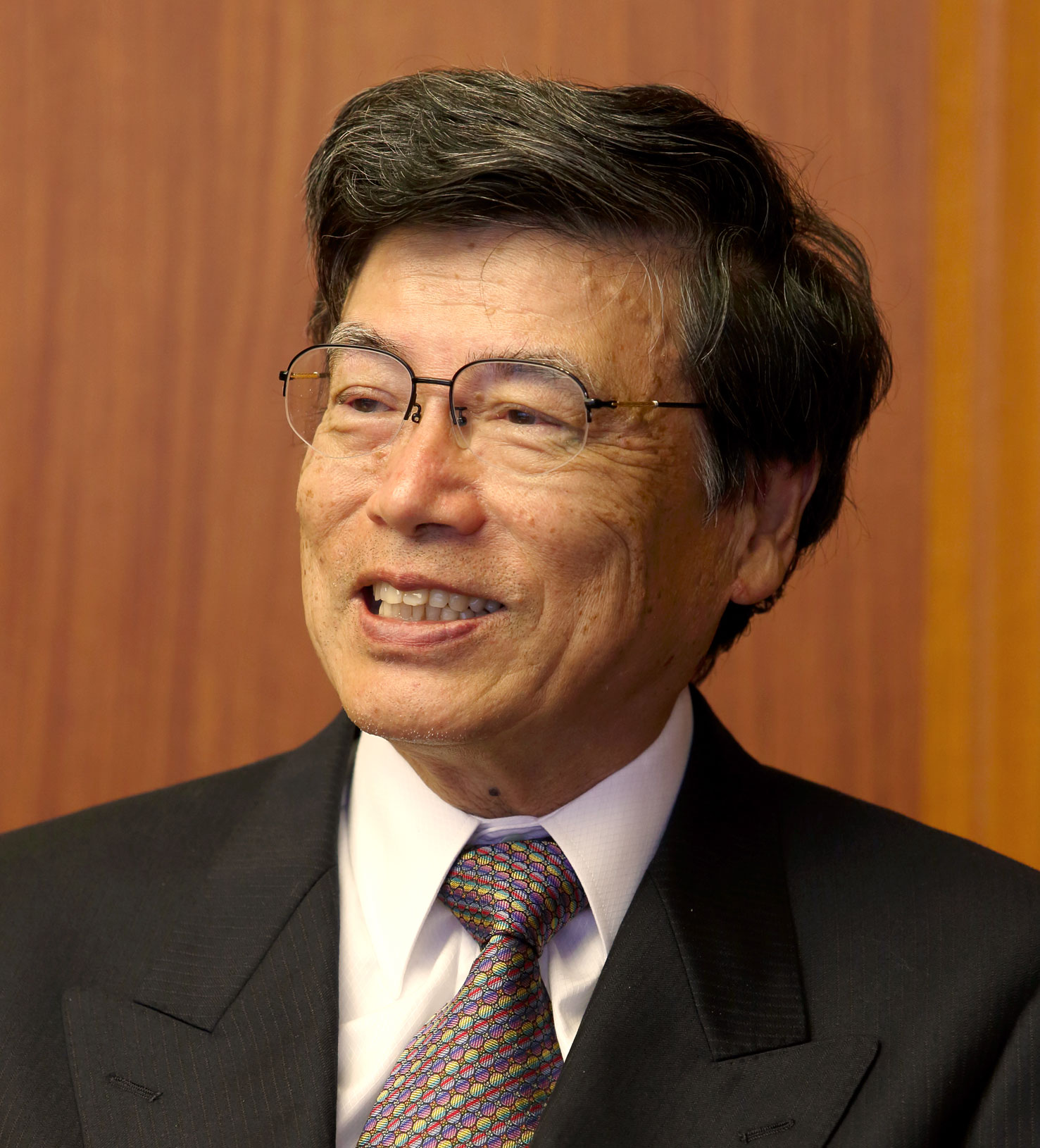About the R-GIRO
Message from
the Former President, R-GIRO


The Third-Phase R-GIRO Research Program
Kicked Off Toward Creating a Sustainable and
Affluent Society in the 21st Century
Our challenge is to create a world-class research center to tackle urgent issues facing the 21st century, using an interdisciplinary approach transcending the boundaries between natural sciences and humanities/social sciences.
Murakami: We at Ritsumeikan University have focused our efforts on elevating the quality of research and education to world standards. As part of such efforts, the Ritsumeikan Global Innovation Research Organization (R-GIRO) was established in April 2008, aiming to create a unique, world-class researchcenter. In launching the R-GIRO, exhaustive discussions were carried out on the development of its organizational philosophy. Lack of a philosophy would make even a center of excellence something temporary, preventing it from taking strong hold in a university. In the 20th century, innovations in science and technology brought material wealth to humans. At the same time, however, they also left a lot of negative legacies, including environmental destruction, to people today. Given these situations, Ritsumeikan University unanimously agreed to establish a philosophy of “creating an affluent society that is able to operate sustainably,” under which we would strive to resolve such issues. In AY 2008, R-GIRO commenced its research activity in the fields of natural sciences, with the creation of a society capable of co-existing with nature (the earth’s return to nature) as an ultimate goal. In AY 2009, the domain of research was expanded to include humanities and social sciences. Since then, R-GIRO has been promoting interdisciplinary research projects that combine natural sciences with humanities and social sciences.

Former President of Ritsumeikan University
Yoshida: The primary mission of Ritsumeikan University is to provide high quality education unique to a private university. It is also another important responsibility for us to effectively disseminate research findings to society, eventually thereby contributing to the welfare of humankind and the world of the 21st century. The quality of education will also be enhanced by making optimal use of research findings and achievements.
Murakami: I agree. There are few students who learn firsthand how research and studies carried out by universities can be of help in the world. R-GIRO will provide students with an opportunity to have a clear understanding of how important it is to promote integrated research that combines natural sciences with humanities and social sciences and how research findings can be used for future generations.
Yoshida: Ritsumeikan University’s greatest advantages are to, as a comprehensive university, have various colleges of science and engineering to offer a high level of education and research in the field of natural sciences, and to provide a wide variety of opportunities for students to interact beyond the boundaries of colleges and departments. These strengths have also enabled Ritsumeikan University to facilitate unique interdisciplinary research and studies, including those at the R-GIRO. Another key factor is close collaboration and cooperation between faculty and other staff members. Faculty members and students are key players in research, but without the help of office staff members, it would be difficult for them to promote their research activities.
Murakami: I certainly think so. The unity of our faculty and other staff members is a valuable asset to Ritsumeikan University. The development of R-GIRO that has been achieved so far is largely attributable to the strong leadership shown by the President of Ritsumeikan University, who has concurrently served as President of the R-GIRO, under which campus-wide efforts have been made toward the goals set. The Second-Phase R-GIRO Research Program launched in AY 2012 consolidated 33 projects into nine projects at eight research centers, in which efforts were made to put research achievements into practical use, including commercialization.
Yoshida: The First- and Second-Phase R-GIRO Research Programs have yielded remarkable results. These seven years of efforts made in various areas – such as the development of young researchers, the promotion of integrated research that combines natural sciences with humanities and social sciences, and close cooperation between faculty and other staff members – have borne fruit. In terms of the number of projects selected for Grants-in-Aid for Scientific Research (KAKENHI) in AY 2014, Ritsumeikan ranked 26th among universities in Japan and 4th among private universities. Nine out of 17 projects selected for the MEXT (the Ministry of Education, Culture, Sports, Science and Technology) -supported Program for the Strategic Research Foundation at Private Universities have currently been implemented and promoted under the leadership of researchers from R-GIRO research programs. In 2014, Ritsumeikan was the only private university to be selected out of 190 applications for two trial research bases of the MEXT’ prestigious Center of Innovation Science and Technology based Radical Innovation and Entrepreneurship Program (COI STREAM). In AY 2015, moreover, “Bright Future for All Ages with Health Innovation by Daily Exercise,” a research program which has been promoted with R-GIRO at the core, was officially adopted by COI STREAM.
Murakami: R-GIRO has brought about substantial results in terms of developing young researchers as well. Every year 50 to 60 persons are employed as professional researchers to engage in advanced research in R-GIRO. They have acquired a high level of professional skills and expertise, and many of them have been playing active roles in various fields of specialization.
Under the Third-Phase R-GIRO Research Program, the Center of Excellence Gathers Momentum: Aiming to Create an Affluent Society that Is Able to Operate Sustainably

Murakami: In AY 2016, R-GIRO will enter the third-phase research program. Under the leadership of the newly appointed President of Ritsumeikan University, we are determined to step up our efforts toward the goals, while continuously pursuing research based on the results achieved so far. How can we help realize a sustainable society in which people fully enjoy affluence and a sense of well-being in the 21st century? We will address this issue by focusing our efforts on specific research projects from a global perspective, including tackling aging society with fewer children and environmental deterioration, both of which are pressing problems confronting Japan.
Yoshida: The time of Japan following after developed countries is over. The time has come for the nation to display its leadership to the rest of the world in the area of science and technology. As the world’s most advanced country in terms of an aging population with a declining birthrate, it is important for Japan to present a road map to the future to other nations that follow in its footsteps. In the Third-Phase R-GIRO Research Program as well, I hope that individual researchers will pursue research from a creative and unique perspective and with a determination to achieve world-class results.
Murakami: In the Third-Phase R-GIRO Research Program, our efforts will be focused on various research areas where we can take full advantage of Ritsumeikan University’s strengths, including food supply, an increased human health span, the development of environmentally-friendly energy, and water and environmental issues. To tackle these issues, it is essential to take a more integrated approach than ever, combining natural sciences with humanities and social sciences. We will also seek to further promote collaboration and cooperation beyond the boundaries of research and between industry, government and academia.
Yoshida: I believe that the areas of psychology, law, sociology and other humanities and social sciences – which are disciplines that Ritsumeikan University offers – will make a more significant contribution. Based on the results achieved through its first- and second-phase research program, R-GIRO is expected to make greater strides forward in the third-phase research program. To pursue and advance the research conducted so far, the organization also needs to continue to devote its energies to developing young researchers. I expect Ritsumeikan University and R-GIRO to contribute to creating a society that enables human coexistence (a sustainable society despite an aging and shrinking population) through their unique research initiatives.
(Partially reprinted (in Japanese) from R-GIRO Quarterly Report vol. 21 [Summer 2015])


